Key takeaways:
- Selective mutism is an anxiety disorder that prevents individuals, particularly children, from speaking in certain social situations, despite being verbal in comfortable settings.
- Building genuine friendships is essential for individuals experiencing selective mutism, as supportive companions can ease anxiety and foster communication.
- Creating low-pressure social environments and engaging in non-verbal activities can facilitate deeper connections for those with selective mutism.
- Nurturing friendships involves understanding individual needs, practicing active listening, and adapting social settings to make friends feel comfortable and supported.
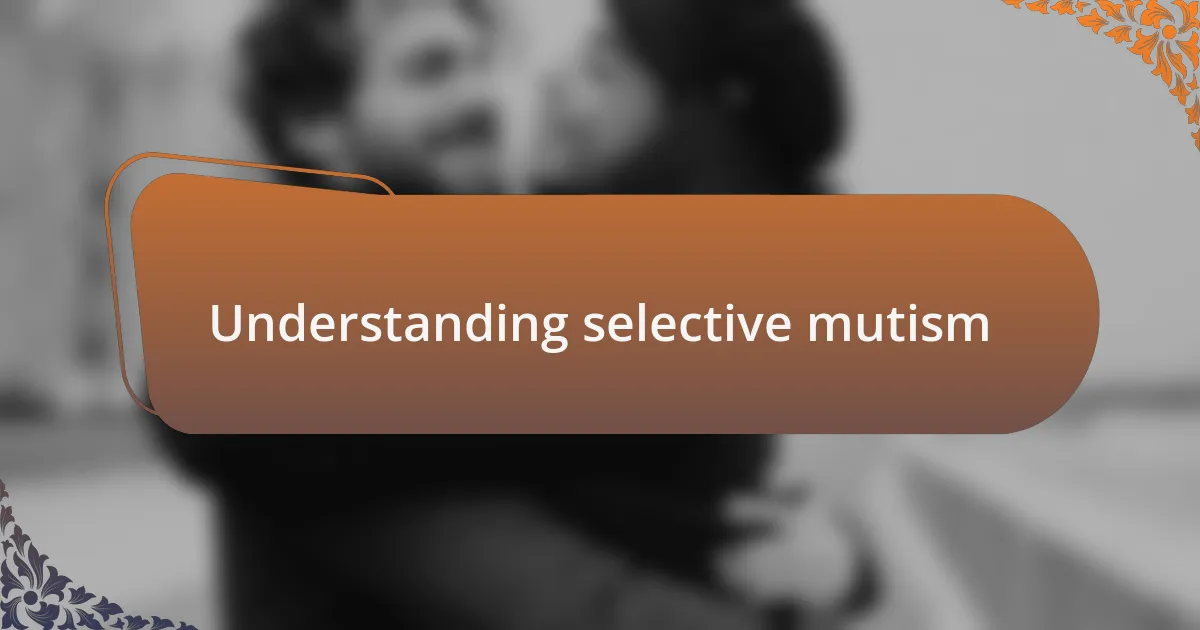
Understanding selective mutism
Selective mutism is a complex anxiety disorder that primarily affects children, making them unable to speak in certain social settings, despite having the ability to communicate verbally in comfortable environments. I remember how difficult it was to witness a close friend struggle with this condition; she was vibrant and chatty at home but would fall silent in public. It makes you wonder, what stifles that natural urge to express oneself in places where it’s expected?
The challenges of selective mutism extend beyond mere silence; they often involve a profound fear of judgment and a deep-seated anxiety that can isolate individuals. I’ve seen firsthand the emotional toll this takes—not just on the person affected, but also on their families and friends who often feel helpless. Have you ever felt the pressure to speak up but found yourself locked in your own thoughts? That’s a common experience among those dealing with selective mutism.
Understanding this condition is essential for fostering empathy and support. It’s not simply shyness; it’s an overwhelming fear that can cripple a person’s ability to connect with others. I once had a conversation with someone who described selective mutism as feeling trapped in their own body. This metaphor resonated with me, illustrating just how vital it is to approach those affected with patience, understanding, and gentle encouragement.
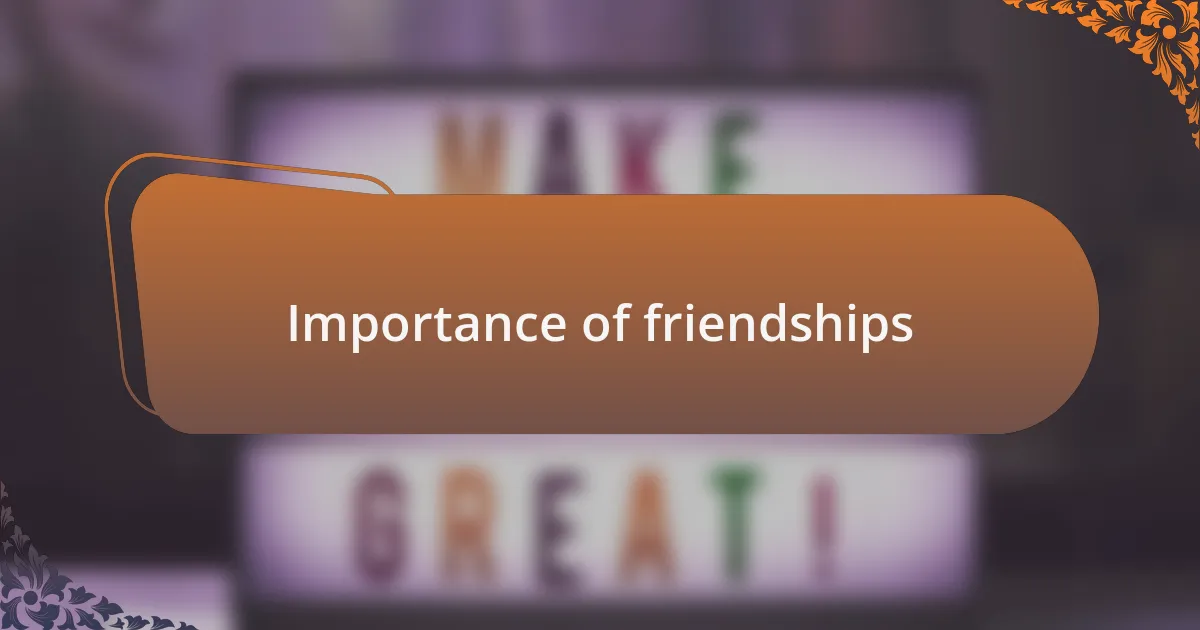
Importance of friendships
Friendships serve as a crucial lifeline for individuals experiencing selective mutism. I remember a time when a close friend’s unwavering support made a world of difference in my social interactions. It’s fascinating how a genuine friendship can create a safe haven, allowing someone to gradually step outside their comfort zone and practice communication in an accepting environment.
The beauty of friendships lies in their ability to foster resilience and confidence. When I recall moments spent with friends who understood my struggles, I realize how their patience and encouragement became stepping stones for me. Have you ever noticed how just having someone by your side can ease the weight of anxiety? It’s that shared understanding that can help break down the barriers that selective mutism often erects.
In the journey of overcoming selective mutism, friendships also provide a sense of belonging. I’ve seen how moments of laughter and shared experiences can create bonds that make difficult times feel a bit more manageable. In those moments, I often ponder: how much easier would it be to navigate social situations if more people understood the nuances of selective mutism? Such connections remind us that friendship is not just about conversation; it’s about empathy and presence.
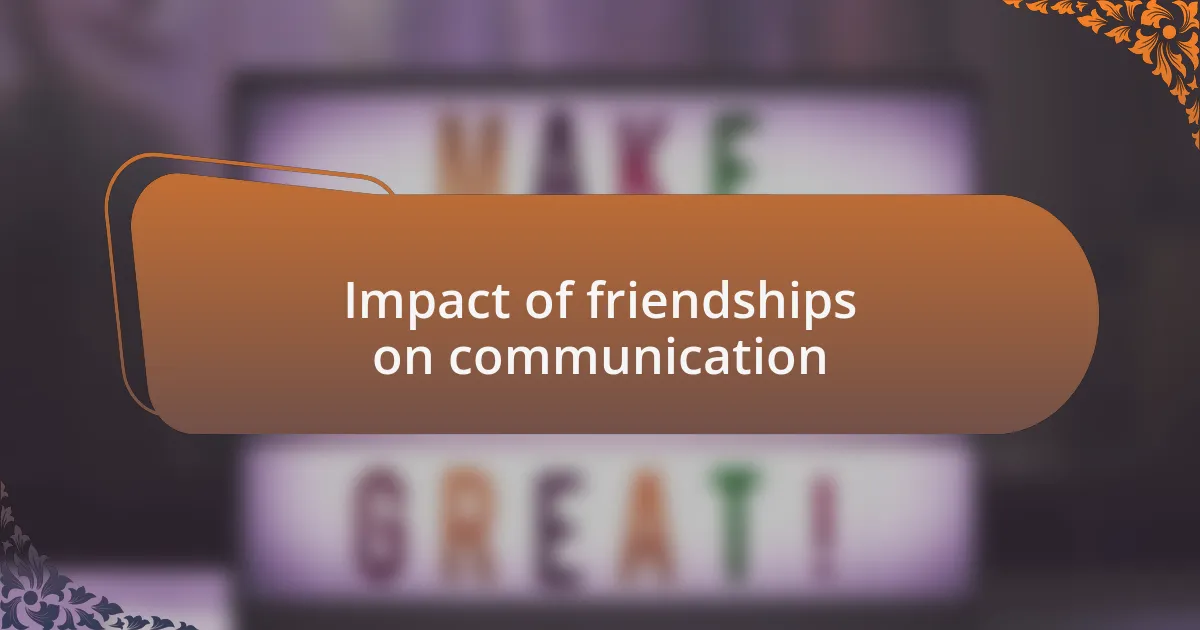
Impact of friendships on communication
Building genuine friendships significantly influences the way we communicate, especially for those of us navigating selective mutism. I remember a time when a friend initiated simple, low-pressure conversations, which gradually encouraged me to voice my thoughts more freely. I often wonder: how can such small actions create a ripple effect in our ability to communicate?
Friendships often offer a mirror reflecting our strengths and areas for growth. In my experience, one friend celebrated my small victories in communication, no matter how trivial they seemed. This acknowledgment infused me with a sense of validation that made taking the next step in conversations a little less daunting. Have you ever felt that rush of confidence from someone cheering you on?
Moreover, the emotional connection we share with friends can greatly enhance our comfort levels in expressing ourselves. I recall a particularly poignant moment when I struggled to speak openly in a group. The gentle encouragement from a close friend not only quelled my anxiety but also ignited a desire within me to communicate. Is it that emotional safety provided by friendship that allows us to find our voice amid our struggles?
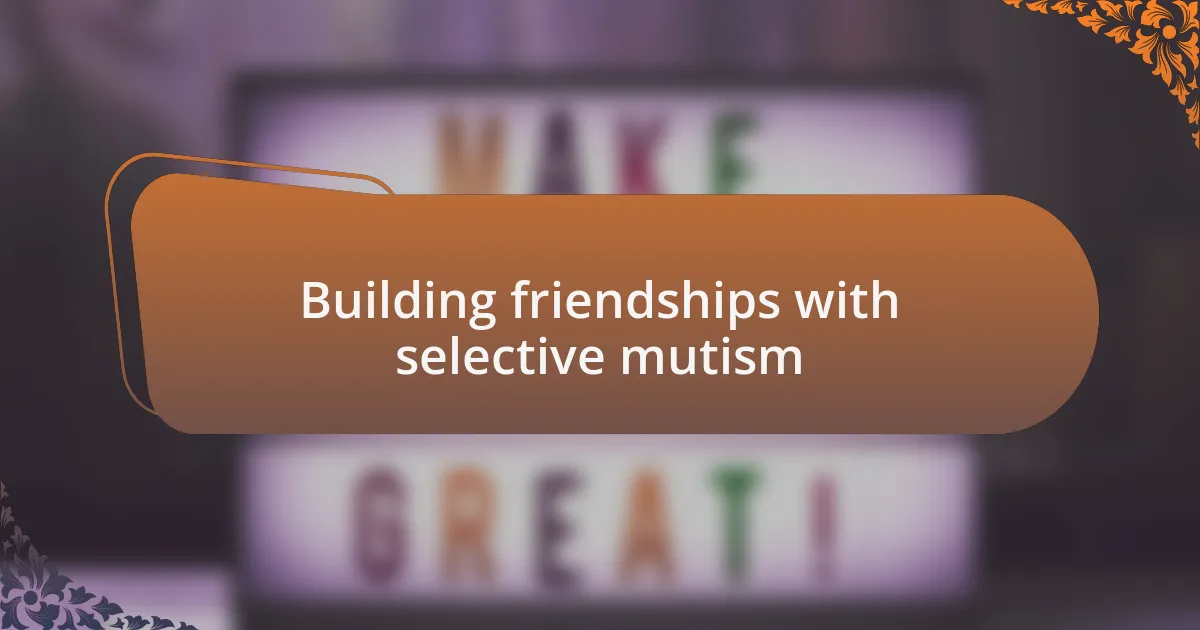
Building friendships with selective mutism
Building friendships when you have selective mutism can be a delicate dance. One of my close friends once made it a point to engage with me in quieter settings. We would sit together with a book or watch a movie, giving me the space to express myself without the pressure of conversation. Have you ever noticed how a relaxed atmosphere can peel back the layers of silence?
I’ve found that choosing friends who understand my challenges leads to more meaningful connections. One friend, who shares similar experiences, would often send texts just to check in, knowing that written communication felt safer for me. It allowed me to gradually transition into face-to-face interactions over time. Isn’t it interesting how a simple message can pave the way for deeper friendships?
Moreover, initiating activities that don’t solely rely on verbal interaction can be a game-changer. I once joined a small group where we did art projects together. The focus on creativity instead of conversation lifted so much pressure off me and led to genuine connections. Have you ever participated in something where the activity itself brought people together, making communication feel less intimidating?
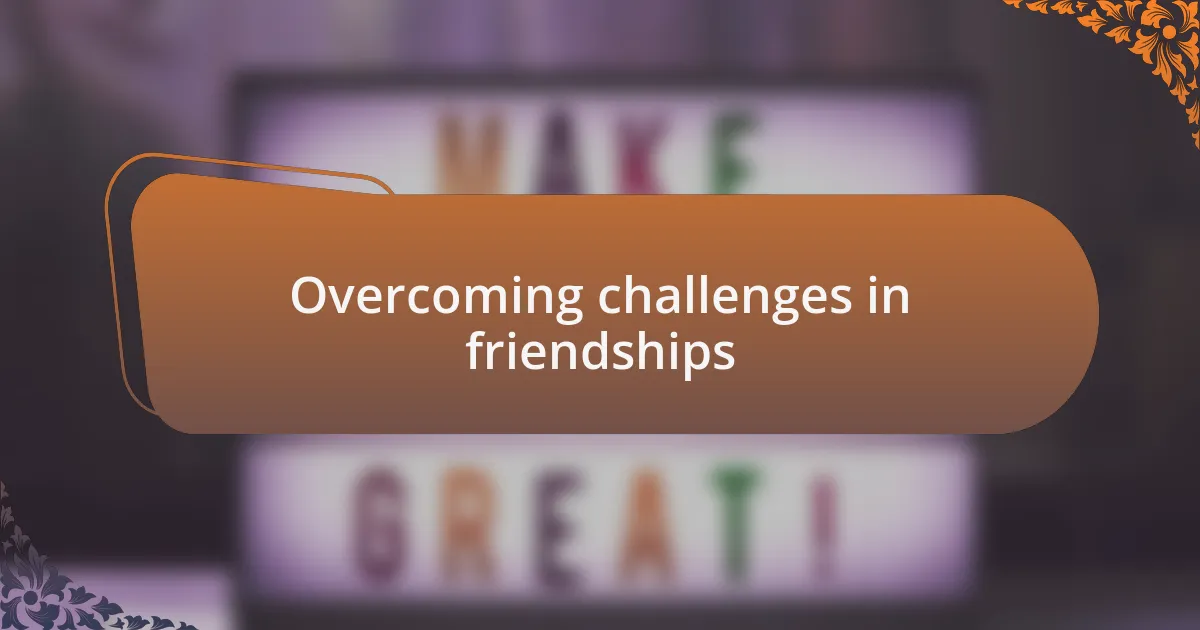
Overcoming challenges in friendships
It’s important to remember that overcoming challenges in friendships often requires patience and openness. I recall a time when a friend invited me to a game night, and I was hesitant at first. But as the games progressed and laughter filled the room, I found myself loosening up, realizing that fun can bridge the gap created by silence. Have you ever felt that spark of connection during a shared experience, even when words were scarce?
Another significant challenge I faced was dealing with the fear of being misunderstood. One evening, a friend noticed I was unusually quiet and checked in with me privately, expressing concern without pressure. That small act of kindness made a world of difference. It made me think: how often do we take a moment to genuinely understand our friends?
Reflecting on my own journey, I’ve learned that expressing my feelings and expectations has been vital in my friendships. I once shared my struggles with a friend who then offered to create a signal that would help me communicate when I felt overwhelmed. It’s moments like these that remind me of the beauty in vulnerability. Isn’t it fascinating how sharing our truth can strengthen the bonds we cherish?
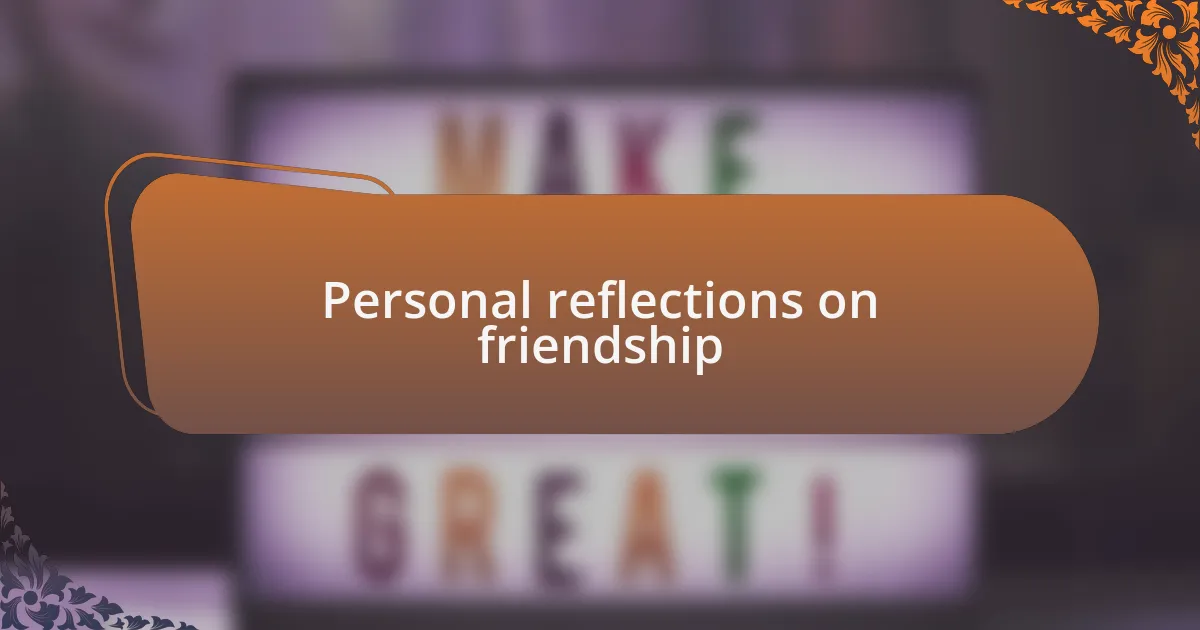
Personal reflections on friendship
Friendship carries profound weight in our lives, especially when navigating the complexities of communication. I remember a period when I struggled to articulate my thoughts. A close friend noticed I was more withdrawn than usual and instead of asking directly, she simply shared her own silence during our time together. This unspoken bond spoke volumes; it was a reminder that sometimes, there’s strength in quiet understanding. Have you ever felt that comfort when someone just gets it without needing a million words?
One unforgettable experience was a day spent in nature with a few friends. We hiked in comfortable silence, occasionally exchanging smiles or nods, and I realized how friendships can thrive beyond verbal exchanges. It was in that serene setting that I felt the depth of connection—our shared moments didn’t require constant chatter. Have you experienced such peace in companionship, when words seemed irrelevant?
In my reflections on friendship, I find it crucial to acknowledge the importance of being fully present. There was a time when I was preoccupied with my worries, and a friend gently reminded me that our time together deserved my undivided attention. That nudge not only helped me engage more deeply but also reinforced the idea that genuine friendships flourish in the moments we choose to show up for one another. What have you learned about being present in your relationships?
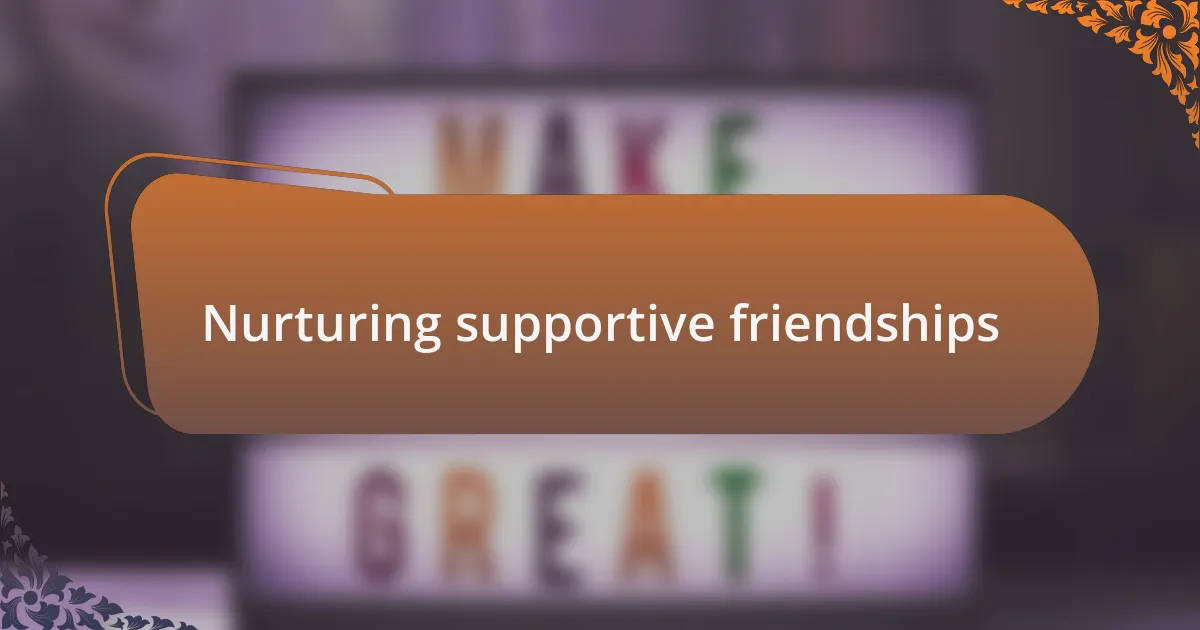
Nurturing supportive friendships
Nurturing friendships requires an understanding of each individual’s unique needs, particularly in environments where communication can be challenging. I remember a time when I was hesitant to speak during group gatherings. A friend frequently checked in with me, offering encouragement with small gestures or shared silence. This subtle support not only made me feel safe but also strengthened our bond—do you have someone in your life who seems to know just the right way to help you feel comfortable?
Creating a supportive environment is also about honoring each other’s pace. One of my closest friends, who often struggles with social interactions, shared her fear of speaking up in larger groups. By suggesting smaller gatherings where she felt more relaxed, we nurtured her confidence organically. It was rewarding to witness her gradually opening up—how important is it for us to adapt our social settings to accommodate our friends’ comfort?
In my experience, active listening can be a game-changer in nurturing friendships. I recall a moment when I simply listened as a friend shared her struggles with selective mutism. Her relief at being heard was palpable. This experience made me realize that sometimes, the best way to nurture our relationships is to just be there, lending an ear without judgment. How often do we create spaces for our friends to express themselves freely?